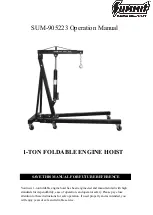
Synthes Air Powered Equipment
Cleaning
Before cleaning, remove all
instruments, attachments and
hose from the air drive unit.
Do not immerse in water.
Do not clean in automatic
washer or ultrasonic
cleaner.
Use a neutral pH cleaning
solution.
Clean and lubricate drive unit,
attachments and air hose
by hand immediately after
each use.
General Maintenance
Reverse trigger
(both triggers)
Variable speed
trigger
Attachment
release button
Air control valve
ComPact Air Drive II (511.701)
Air inlet
1
Manually clean air drive and
attachments under running
water. Use a mild cleaning
solution (neutral pH) and a
soft brush.
Do not allow water to
enter the air inlet of the
drive unit.
2
Clean cannulations of the air
drive and attachments with
the cleaning brush. Do not
insert cleaning brush into the
air inlet.
The Quick Coupling for
K-wires (511.791) must be
fully open to its maximum
diameter of 3.2 mm before
inserting the brush.
3
Retract and clean the quick
coupling hose end with a
soft brush and mild cleaning
solution.
Do not allow water to
enter the air inlets.
4
Clean hose with a mild
cleaning solution and a soft
brush or cloth.
Keep hose ends out of
water.
Dry all instrumentation
with a soft cloth.
Before cleaning, turn air control valve to the “off” position. Manipulate moving parts
under running water to loosen and remove debris. Open and close chucks, and move
quick couplings back and forth.
Lubricating
Lubricate the ComPact Air Drive II after every cleaning and before sterilization.
Use Synthes Autoclavable Oil (519.97).
Important: Never lubricate the radiolucent drive.
1
Before lubrication, open air
control valve. Apply approx-
imately five drops of oil into
the air intake of the drive
unit. Lubricate triggers.
2
Connect the air drive to an air
hose. Run the air drive for 20
seconds in both directions.
3
Lubricate all moving parts of
the attachments with one
or two drops of oil. Operate
the parts to distribute the oil.
Wipe off excess oil.
4
Lubricate the quick coupling
hose end with one or two
drops of oil.
Forward
(Lower trigger)
Reverse
(both triggers)






















